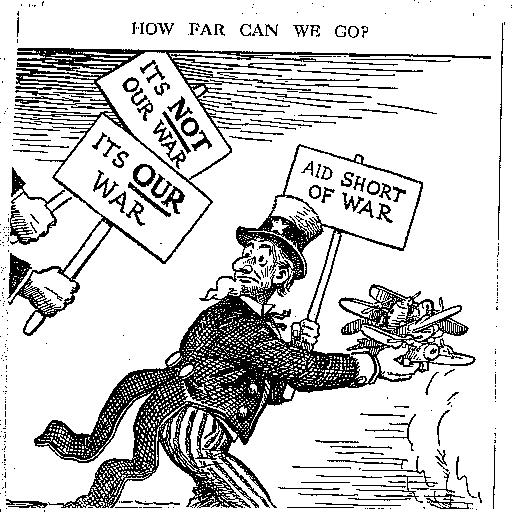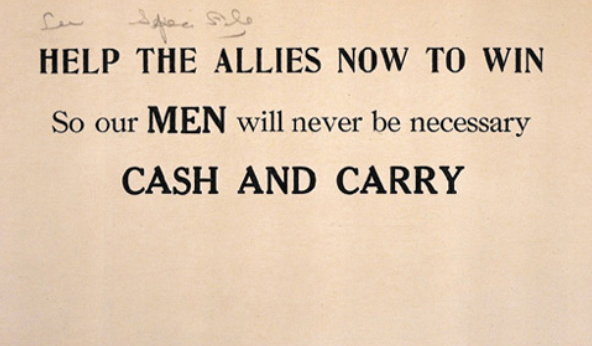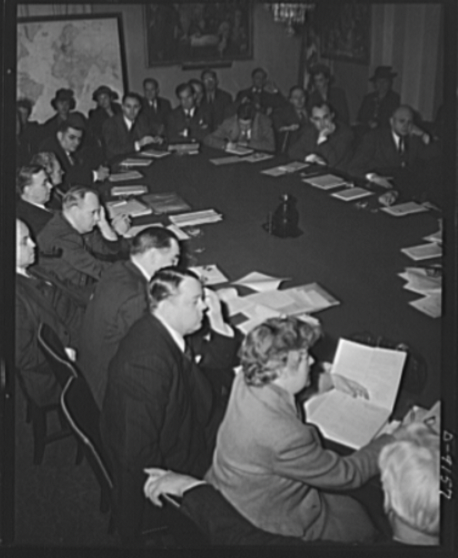Debate on the Home Front
Upon Roosevelt's proposal to Congress to lend or lease war supplies to Great Britain, a debate erupted across America: Should we support the Allies and take one step closer to becoming directly involved in the war? and was aiding Britain in our best interest? Following months of intense debate, Roosevelt and his political allies were able to convince the American public and Congress to be the "arsenal of democracy."
"In the face of great perils never before encountered, our strong purpose is to protect and perpetuate the integrity of democracy. We do not retreat. We are not content to stand still. As Americans, we go forward, in the service of our country, by the will of God."
~ President FDR in his 3rd Inaugural Address, January 20, 1941

Courtesy of clipartsuggest.com

Postcard supporting aid, but not troops
Courtesy of the House of Representatives National Archives, 1939
In the decades following WWI, the majority of Americans were wary of involvement in another international conflict. When the Axis powers began taking aggressive actions in Europe, isolationist members of Congress sought to limit US involvement. But, when Germany invaded Poland, Roosevelt insisted that while the US could remain neutral, it was immoral "that every American remain neutral in thought as well." As a result, Roosevelt convinced Congress to sell weapons to Allied powers. The US utilized a "cash-and-carry" basis, where the Allies paid cash for supplies and had to transport the supplies on their own ships. But, as the Axis spread, Britain's resources were drained. British Prime Minister Winston Churchill warned they would be unable to pay for military supplies and shipping.
Despite his pledge to keep America out of WWII, Roosevelt wanted to support the Allied war effort. He tirelessly worked to convince Congress and the public that providing direct aid to Britain was in the national interest. In December of 1940, Roosevelt presented to Congress the Lend-Lease Act that allowed the US to lend, rather than sell, military supplies to Britain. Roosevelt argued:
"We must be the great arsenal of democracy... For us, this is an emergency as serious as the war itself. We must apply ourselves to our task with the same resolution, the same sense of urgency, the same spirit of patriotism and sacrifice as we would show were we at war."
~ President Roosevelt, 1940
As word of the Lend-Lease Act disseminated across America, it was met with significant opposition, specifically from isolationists and individuals who believed the Act gave Roosevelt too much power. Roosevelt's supporters argued that providing aid to the Allies was a necessity.

House of Representatives Foreign Affairs Committee discussing Lend-Lease.
Courtesy of the Library of Congress
Courtesy of Critical Past
Pro-Lend-Lease
"We cannot retain our self-respect and haggle over the terms with which we will lend our help to the Birtish... when [the] are bearing their breasts to the storm of battle... The President... has suggested that we eliminate from our discussion with the British, the dollar sign, and proceed to lend them... the vital things they need to carry on the war to a victorious conclusion. At a time when the very fate of our kind of a world hangs in the balance, we must not let this British lack of dollar exchange halt the flow of material to Britain, so vital to her defense -- which is also our defense... The preservation of the sacred fire of liberty has become our responsibility."
~ Frank Knox, Secretary of the Navy, February 20, 1941
"Our most useful and immediate role is to act as an arsenal for [European nations] as well as for ourselves... Considering what is best for our security, we are free to decide how much should be kept here and how much should be sent abroad to our friends who... are giving us time in which to make ready our own defense. For what we send abroad shall be repaid, repaid within a reasonable time following the close of hostilities, repaid in similar materials, or at our option in other goods of many kinds which they can produce and which we need... Such aid is not an act of war, even if a dictator should unilaterally proclaim it to be so."
~ FDR state of the Union Address to Congress, January 6, 1941
"On no other question of public policy are the people of this country (United States) so nearly unanimous and emphatic today as they are on that of the imperative need, in our own most ivtal interest, to give Great Britain and other victims of attack aid in the shortest possible space of time."
~ Secreatary of State Cordell Hull, Testimony before the House of Foreign Affiars Committee, January 15, 1941
Anti-Lend-Lease
"Today we ae feverishly adding further billions to our national debt to buy armaments, partly for our own use but mostly to arm England... This in the face of the fact that England still some $2,000,000 of credit in this country, and far-flung colonies from which to draw resources."
~ Senator Arthur Capper of Kansas, Frebruary 7, 1941
"[Lend-Lease] will lead us down that road with only one ending, total complete and futile war... Remember, if we lend or lease war materials today, we will lend or lease American boys tomorrow... the cost of this was will come out of the millions of poor people, the common fold of the world who will toil for generations to pay the cost of destruction."
~ Senator Burton Wheeler of Montana
"They have been fighting in Europe for 2,000 years or more, and probably they will fight for the next 10,000 years. For that is their philosphy -- fighting is their philosophy. This measure is a complete surrender of the responsibilities given the Congress by the Constitution and sets up a dictatorship for the President... Right now, the greatest step in protecting America first is to kill this so-called lend-lease, this lend-lose bill, that really is a war-dictatorship bill."
~ Senator Authur Capper of Kansas, February 7, 1941
Joseph Politi, Ella Forkin, and Slade Forkin
The Point of No Return: The U.S., Allied Powers, and Lend-Lease
Group Website, Senior Category
Website Word Count: 1197
Multimedia Length: 2:36 minutes
Process Paper Word Count: 500